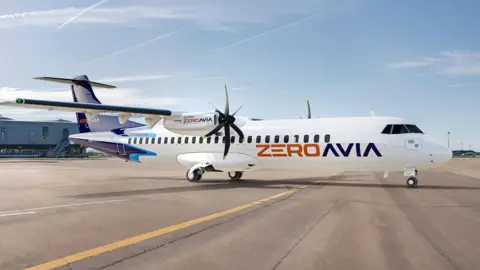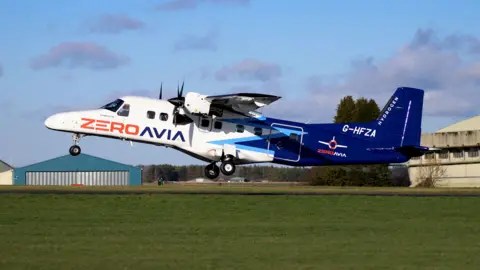Electric plane tech centre to be built near Glasgow Airport
 ZeroAvia
ZeroAviaA new manufacturing centre for zero-emission aircraft technology is to built near Glasgow Airport.
ZeroAvia said a facility to develop and manufacture hydrogen fuel cells for small electric planes could be in operation by 2028, creating around 350 jobs.
The US-based start-up has previously conducted test flights in England with a 19-seater aircraft which was powered by a hydrogen/electric system.
The firm has received millions of pounds of backing from the UK and Scottish governments, and Scotland's National Investment Bank.
The new Hydrogen Centre of Excellence and manufacturing facility with be located within the Advanced Manufacturing Innovation District near the airport in Renfrewshire.
It will focus on developing the hydrogen fuel cells, while the electric motors will be built in the US and the planes tested at Cotswold Airport in Gloucestershire.
First Minister John Swinney and Scottish Secretary Ian Murray both attended an event at Glasgow Airport to launch the firm's plans.
Swinney said: "ZeroAvia's decision to establish a base in Scotland – creating 350 highly-skilled jobs in the process - is the perfect illustration of Scotland's growing reputation in the global transition to net zero."
Murray said millions of pounds of UK government investment would create and support hundreds of Scottish jobs.
"It is a perfect example of the UK and Scottish governments working together to drive innovation and manufacturing in Scotland," he said.
The firm has received £32m of investment from the UK's National Wealth Fund and £18.5m of research funding since 2019.
Scottish Enterprise has also provided £9m of grant funding while the Scottish National Investment Bank has invested £20m.
 ZeroAvia
ZeroAviaThe aviation industry is thought to account for 2-3% of global carbon emissions, and decarbonising the sector is a major technical challenge.
The weight of batteries limits their potential for electric aircraft, and a number of firms are instead looking to use hydrogen to generate electricity on board the plane itself, using hydrogen fuel cells.
The only emissions from this process would be water.
In 2023 ZeroAvia successfully tested a twin-engined Dornier 228 aircraft, normally powered by kerosene, with one motor powered by a hydrogen electric system.
The firm has submitted its first full engine for up to 20 seat planes for certification from aviation regulators, and is working on a larger system for 40-80 seat aircraft.
A spokesperson said it was hoping to get its first regulatory approvals next year, and it had received advanced orders for nearly 3,000 power systems and components.
Hydrogen economy
The founder and chief executive of ZeroAvia, Val Miftakhov, said Scotland had been chosen for the new facility because of its strong aerospace and engineering skills and "burgeoning" hydrogen sector.
"The aviation industry is on the cusp of the biggest transformation since the advent of the jet age, with entirely new propulsion systems set to power the next era of aviation – cleaner flights, better economics and better experiences for all," he said.
"With this new facility, Scotland has a big role to play in driving this transformation."
The environmental credentials of hydrogen depend on how it is produced.
"Green hydrogen" produced from wind or solar power is considered environmentally friendly but "grey hydrogen" produced from fossil fuels can lead to significant greenhouse gas emissions.
Scotland is hoping to become a major producer of hydrogen.
Glasgow Airport recently hosted a summit on plans for it to become a "hydrogen hub" by 2027 to support zero-emission aviation.
ZeroAvia currently employs about 100 people in the UK and 200 at sites in the UK.
